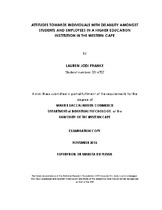| dc.description.abstract | Even though attitudes have been studied for many years, attitudes toward individuals with disabilities still remain an important issue, today (Geskie & Salasek, 1988; Popovich, Scherbaum, Scherbaum & Polinko, 2003). With the relationship between numerous demographic factors and attitudes toward those with disabilities being inconsistent across existing research and the absence of research conducted in the South African context this research study investigated whether variables such as gender, age, education level, exposure to a person with a disability or having a friend or family member with a disability had an effect on attitude towards disability. The population of this study constituted students from the Economic and Management Sciences (EMS) Faculty and Support Staff in a Higher Education Institution in the Western Cape. A non-probability convenience sample method was utilised of which 140 respondents completed two questionnaires. Namely, a Biographical questionnaire and the Affective Reactions Subscale of the Disability Questionnaire (Popovich et al. (2003). Statistical analyses included both descriptive and inferential statistics (the t-Test and ANOVA). According to the findings of this research study, significant relationships do not exist between variables such as gender, age, educational level, amount of contact and exposure to or having a friend or family member with disability and staff and student attitudes toward those with disabilities in a Higher Education Institution in the Western Cape. A few limitations related to the study were recognized and it is recommended that a combination of quantitative and qualitative research approaches be implored as well as other faculties and Institutions in the Western Cape be used to contribute to greater representativeness and generalisability for future research. Also, to establish organisations or institutions as employers and institutions of choice among those with disabilities, organisations and institutions are to better market disability facilities and accommodations. It is also proposed that students and staff with disabilities should be encouraged to fully participate in the design and event management of disability awareness campaigns. | en_US |

